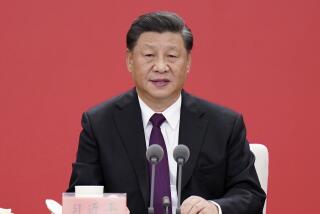As Evidence of Political Maturity, China Needs an IndependentNewspaper
- Share via
My first impression upon returning to Los Angeles was that everything seemed familiar. I have been here twice before, in September, 1982, and January, 1983. But except for some airport construction done for the Olympics, nothing seemed to have changed much along the freeway to Westwood--at least if I didn’t try to calculate the impact that the AIDS scare must be having. My thoughts turned to China, and to the changes that seem constantly to occur there.
Just a year ago I was expelled from the Chinese Communist Party in a campaign to “oppose bourgeois liberalism”; yet now I have been permitted to travel to America, that most “liberal” of countries. In China, when concerned readers first saw the item about my travel permit in the press, they invariably felt surprise, viewed it as good news, and spread the word orally. (Many could remember that it was also in March, 30 years ago, that I was first labeled a “rightist element” and sent off to a mountain village for labor reform on the charge of “opposing the party and opposing socialism.” It took 21 years to be exonerated.) Last year, three of my books were disapproved for publication; this year, four of my books will be coming out within three months. Such is the nature of change in China today.
Of course, not everyone is as fortunate as I. Some of the Chinese scholars accused of “liberalism” still, to this day, cannot publish their work. Among the people who have cooperated with me in the past, and who now suffer from this association, some are still being denied their right to work, and others are denied their proper job titles.
Many of the big changes of recent years have come in economic matters. There are already more than 10 million small-scale “individual entrepreneurs” in China, and the legality of “private enterprise” is due to be written into the Chinese constitution. More and more state enterprises have been assigned to private parties on contract.
Yet, along with this increasing “liberality” in economics, in the areas of politics and ideology we have witnessed successive campaigns against “bourgeois liberalism” in 1981, 1983 and 1987. Each campaign has been fiercer than the last, yet the public’s response, significantly, has been increasing disgust or indifference. In last year’s campaign, Chinese intellectuals openly displayed their resentment as never before. In the past, a self-imposed silence was about the only means by which one could resist, but last year intellectuals dared for the first time to voice their opposition directly.
Unfortunately, however, China’s newspapers can print only news and opinion that the party favors. Thus the public influence of this new dissenting opinion was limited. The flow of information remained so clogged that even the intellectuals themselves could not fully appreciate the effects that they were having in policy-making circles. When last year’s “bourgeois liberalism” campaign ended in failure, intellectuals were not entirely aware that the victory had been their own. Nor could they adequately realize how the successive crackdowns on them were, in the course of events, actually resulting in more rather than less freedom of expression for the Chinese people. In the elections this spring within China’s local and provincial people’s congresses, many officially appointed candidates have been voted out and replaced by people who have more popular confidence. This is unprecedented in the nearly 40-year history of the People’s Republic of China.
The Chinese intellectuals whose professional work is most subject to limitation and interference are journalists and lawyers. Even now lawyers still cannot pursue private practice or defend accused parties in the manner they see fit. In journalism, the government is currently stressing the need to strengthen the “supervisory function” of public opinion; but the government still will not permit the existence of an independent, non-party newspaper. The results of a recent survey of 200 government officials (three-quarters of them party members) show that 75% believe that China’s news media cannot actively criticize or “supervise” the organs of party and government; 65% believe that there is a crisis of confidence between the public and the media; 34.5% support the idea of “allowing an independent, non-party socialist major daily newspaper” to appear.
The Soviet Union also lacks an independent newspaper. But some of its official publications--such as the Moscow News, the Literary Gazette and Ogoniok (Spark)--enjoy much greater freedom than any Chinese publication. Unless China’s leaders wish simply to admit that Mikhail Gorbachev has outdone them in reform, they have no alternative but to increase the freedom of China’s news media. This is where reform of the political system should begin.


